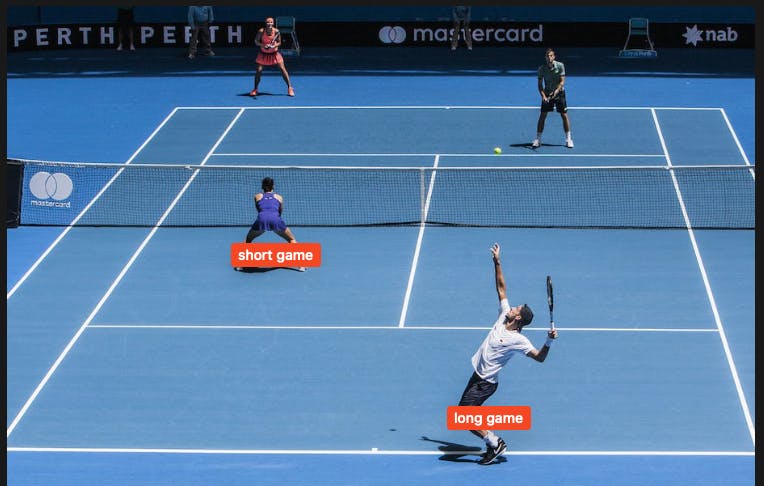DevRel Long Game vs Short Game
A recurring pattern you see in long competitive games is the contrast between a "long" game and a "short" game. As this is the season for setting content goals, I recommend thinking the same for your tactics vs strategy.
Obligatory Sports Analogies
As a former tennis player this is something you pick up very early on and then spend the rest of your life mastering - you need to know to serve and drive powerful baseline hits, but you also need to be ready to run up to the net and volley quickly and deftly when the situation (often) arises.

Anyone who has gotten really good thwacks at the golf driving range, and yet gotten frustrated on the green when playing 18 holes, is also intimately familiar that having good long game cannot make up for a horrendous short game in golf:

Playing The DevRel Long Game
All too often, people only talk about "short game" tactical tweaks in devrel:
running a content calendar or hackathon
editing and marketing a blogpost/video
speaking at a conference
tying releases and products into themes their community is interested in
You can spot a "short game" by how important and time sensitive the activity usually feels at the time, and by how much it feels like it doesn't matter after a month.
I don't mean to minimize "short game" - I'm happy to throw down on suggesting post titles and charts and tweets - and that can be very impactful when the stakes are high, eg you need ONE particular launch/post to go well (so it is worth experimenting when the stakes are low so that you have a muscle for what to do when stakes are high). However the work done in the short game will be significantly boosted if you have a good "long game", and anyone with good enough "long game" can actually start inverting the rules of the short game - visibly breaking the understood conventions for engagement and attention - as a flex (see for example: Mistral choosing to launch with a magnet link and no blogpost because they had confidence/network to make it work).
Some half-formed thoughts on what The Long Game looks like:
Building product users love
Building up good companywide DevRel Infrastructure
Working on positioning/pitch
Actively participating in your community and the broader industry community beyond it, being perceived as a champion for users and thoughtleader on best practices and the future.
You will notice how little control the typical individual contributor devrel has over many of these. This is the job of the founder, and other company leaders/C-suites, to be actively working with their devrel teams, in order for the long game to actively support the short game.
Why this matters
Ultimately every founder/devrel wants the devrel work to contribute towards the bottom line. The "short" game tends to boost virality, but is usually weak on conversions. The "long" game helps improve conversions, but is usually boring (e.g. repeating the same thing over and over again, not tying into current topics and trends).
Think about the tech that you adopt at work:
How did you hear about it at first? Probably through word of mouth from friends and influencers.
How often did you hear about it before deciding to give it a serious look? Probably between 2-20 times, which is what we often experienced at Netlify (the common internet marketing wisdom is you need to hear about a product >12 times before people even register you in their list of options)
Did you say any of that when you brought it up to your boss for adoption? No, probably not - the messaging you date isn't the same messaging you bring home.
Often people make quick decisions in their gut before then looking for rational reasons why their decisions are/are not correct. DevRel must be structured accordingly. In this way, the Long and Short Games mirror the System 1 and System 2 model of Thinking Fast and Slow.